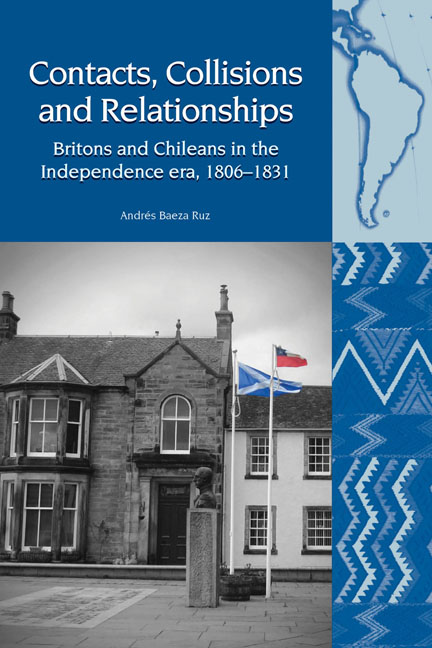Book contents
- Frontmatter
- Contents
- Acknowledgements
- Abbreviations
- Preface
- Introduction
- 1 Invasions, Negotiations and Conspiracies: British-Chilean Relations in an Era of Change, 1806–1817
- 2 Cultural Encounters Offshore: Britons and Chileans in the Chilean Navy, 1817–1823
- 3 Bibles, Schools and Citizens: British Protestant Missionaries and Educators in Chile, 1817–1831
- 4 British Merchants, Private Interests and the Fostering of Free Trade in Chile, 1811–1831
- 5 Beyond Diplomacy: The Cultural Significance of British Recognition of Chile's Independence, 1817–1831
- Conclusion
- Bibliography
- Index
Conclusion
- Frontmatter
- Contents
- Acknowledgements
- Abbreviations
- Preface
- Introduction
- 1 Invasions, Negotiations and Conspiracies: British-Chilean Relations in an Era of Change, 1806–1817
- 2 Cultural Encounters Offshore: Britons and Chileans in the Chilean Navy, 1817–1823
- 3 Bibles, Schools and Citizens: British Protestant Missionaries and Educators in Chile, 1817–1831
- 4 British Merchants, Private Interests and the Fostering of Free Trade in Chile, 1811–1831
- 5 Beyond Diplomacy: The Cultural Significance of British Recognition of Chile's Independence, 1817–1831
- Conclusion
- Bibliography
- Index
Summary
This book has demonstrated the insights that can be found in the analysis of British-Chilean relations in the independence period, which in the case of Chile have been mostly studied relating to the second half of the nineteenth century. The fact that British investments and flows of peoples and goods became increasingly important after 1850, has led scholars like John Mayo to maintain that ‘informal imperialism’ is the appropriate term to describe the ‘anatomy’ of such a relationship. However, such a view is restrictive, allowing an examination of the traditional ambits by which informal empire has been regarded as an analytical tool when approaching the relations between Britain and Latin America. This is to say, the economic and diplomatic means that helped to preserve the subordinate condition of the former Spanish colonies to the interests of the British Empire. In recent years, approaches to the problematic nature of informal imperialism have made it clear that these elements are not enough, that they cannot be the only aspects imbricated in this problem. The cultural dimension must also form part of the analysis of a relationship that, at first glance, seemed to be determined by informal imperialism. This is particularly relevant in a period like the independence era, in which the economic and diplomatic means used by Great Britain to exert its dominion were not as evident as in subsequent years. Indeed, as I showed in the last chapter, Britain was not willing to recognise Chile's independence, even though this would have facilitated its alleged aim of trading at any cost. Therefore, the cultural dimension helps to demonstrate that in the realm of interpersonal relations, in the everyday lives of those who were supposedly affected by British expansionist ambitions, the idea of imperialism or, better, the idea of Britain as an empire that was threating Chile's sovereignty, had different and divergent meanings.
That is why it is so relevant to return to one of the ideas stated in the Introduction to this book, about the persistence of ‘dependency theory’ as an explanatory model of the relations between Britain and Chile. I am not denying that in the long-term study of this history, this could serve as an explanatory model to grasp the way Chile was subordinated to a marginal place in the world economic system.
- Type
- Chapter
- Information
- Contacts, Collisions and RelationshipsBritons and Chileans in the Independence era, 1806-1831, pp. 219 - 224Publisher: Liverpool University PressPrint publication year: 2019

